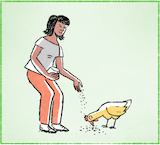
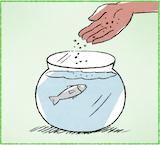
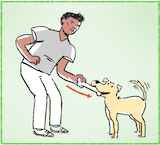
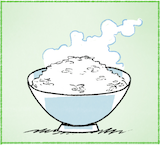
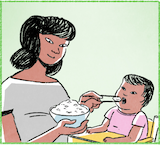
เขากำลังเฮ็ดหญัง เขากำลังเอาเญี่ยให้ไก่
เขาเป็นพุหญิง เขาใส่เสี้ยสีขาว เขาใส่ส้งสีแดง
เขากำลังเอาเญี่ยให้ไก่ เขาเอาให้พุเดียว แล้วกะมีไก่โตเดียว
ไก่มันเป็นสัดหลือคน ไก่มันเป็นสัด ไก่มันบ่แม่นคน
ไก่มันเป็นสัดเลี้ยง สามาดเลี้ยงไว้บ้าน แต่ว่าเลี้ยงคนละแบบกับหมา ไก่เลี้ยงไว้ในคอก หมาเลี้ยงไว้อยู่ในบ้านกะได้
ไก่ต้องกินเข้าบ่ กิน ไก่ต้องกินเข้าซู่มื้อ ต้องให้เญี่ยหลืออาหานมันซู่มื้อ
ไก่มันใซ้ปากจิกแม่นบ่ แม่น ไก่มันใซ้ปากจิก เพาะว่าปากมันน้อย มันต้องจิกกินเอา จิกกินทีละหน่อยๆ
มันหิวบ่ มันกะหน้าสิหิว ขั้นมันบ่หิว มันกะบ่กินเข้า ขั้นมันหิว มันกะเลยกินเข้า
17
ในโถแก้วมีอี่หยัง ในโถแก้วมีปา มีปาโตหนึ่ง ปาโตบ่ใหญ่ ปาโตน้อยๆ ปาโตสีขาว มันกำลังสิอ้าปากกินเญี่ย
เขาเลี้ยงปาไว้ใส บ่ลู้คือกัน เขาอาดสิเลี้ยงไว้ในบ้านกะได้
แล้วเขากำลังเฮ็ดหญัง เขากำลังเอาเญี่ยให้ปา เขาใซ้มือของเขาจับเญี่ยมาให้ปากิน
18
พุซายคนนี้เขากำลังเฮ็ดหญัง เขากำลังเอากะดูกให้หมากิน แล้วหมามันกะกำลังกินกะดูก
หมามันเป็นสัดแม่นบ่ แม่น หมามันเป็นสัด มันเป็นสัดเลี้ยง
คนมักเลี้ยงหมา เพาะว่าหมามันตาฮัก ตาฮักบักคักหนึ่ง คนกะเลยมักเลี้ยงหมาไว้บ้าน เอาไว้เฝ้าบ้านกะได้
เขาเอากะดูกให้หมากิน กะดูกอันใหญ่บ่ ใหญ่อยู่ แต่บ่ใหญ่หลาย กะดูกอันสีขาว
เบิ่งแล้ว หมามันคือสิมักกินกะดูกหลาย คือสิมักกินคัก
แล้วหมามันกะกำลังสั่นหางของมันพ้อม มันคือสิดีใจหลาย มันกะเลยสั่นหางของมัน ที่มันได้กินกะดูก มันกะเลยดีใจ
19
นี้ถ้วยอี่หยัง นี้ถ้วยเข้า
แล้วเข้ามันฮ้อนบ่ ฮ้อนอยู่ เข้ามันหน้าสิฮ้อนบักคัก เพาะว่ามันมีควนออกมาพ้อม กะเลยฮู้ว่า มันเป็นตาฮ้อนหลาย
20
สองคนนี้เป็นแม่กับลูกแม่นบ่ แม่น
แม่ของเขาใส่เสี้ยสีเทา ผมญาวพ้อม กำลังยืนอยู่
ลูกของเขาเป็นเด็กน้อยพุซาย กำลังนั่งอยู่ ใส่เสี้ยสีซมพู กำลังนั่งอ้าปากอยู่
ตอนนี้แม่ของเขากำลังถือถ้วยเข้าอยู่ ถือถ้วยเข้าไว้ถ้าป้อนเข้าลูก
เข้าอยู่ในถ้วยมีเต็มถ้วยเอาโลด เข้าหลายบักคักหนึ่ง หลายจนล้นเอาโลด
เขากำลังใซ้ตะเกียบคีบเข้าให้ลูกเขากิน แล้วลูกเขากะกำลังนั่งอ้าปากกินเข้าอยู่
เด็กน้อยพุซายนี้กำลังนั่งอยู่เทิงเก้าอี้ นั่งเพื่อที่สิกินเข้าที่แม่ของเขากำลังป้อน
เด็กน้อยเป็นตาฮักบ่ เป็นตาฮักอยู่ เป็นตาฮักบักคักหนึ่ง
Link to overview page
Link to dictionary
| Isaan | Pronunciation | Tones | Thai | English/Notes |
|---|---|---|---|---|
| เขา | khao | M | เขา | personal pronoun: he, she |
| กำลัง | gam-laŋ | M-HR | กำลัง | auxiliary indicating continuous or progressive action |
| เฮ็ด | het | H | ทำ | to do, to make |
| หญัง | ɲaŋ | M | อะไร, เป็นหญัง = ทำไม | 1. what {เขากำลังเฮ็ดหญัง = What is he doing?} {ธูปเอาไว้เฮ็ดหญัง = What are incense sticks for?} 2. something, anything, (nothing) 3. เป็นหญัง[...]คือ in initial position: why {เป็นหญังเขาคือใส่บักพิกลงไปในกวยเตียว = Why is he putting chili in [his] noodle soup?} {เป็นหญังหน้าต่างมันคือเปิด = Why is the window open?} {เป็นหญังมันคือมีควนไฟ = Why is there smoke?} |
| เอา | ao | M | เอา | to take, to give {เขากำลังเอาก่องไปซั่ง = he's taking the boxes to weigh them} {หมอกำลังเอายาให้คนป่วยกิน = the doctor is giving medicine to the patient} {เอาไว้ถ้า = is for, is used for, has the purpose of} |
| เญี่ย | ɲi:a | H | อาหารของสัตว์ เช่น ไก เป็ด นก | food for chicken, birds etc. |
| ให้ | hai | LF | ให้ | 1. to give {หมอกำลังเอายาให้คนป่วยกิน = the doctor is giving the patient medicine} 2. for 3. to allow, to be allowed |
| ไก่ | gai | H | ไก่ | chicken |
| เป็น | pen | M | เป็น | 1. to be, to exist 2. to be able to 3. to suffer, sth. happens to 4. เป็นหญัง[...]คือ in initial position: why? {เป็นหญังเขากะคือแปงฟัน = Why is he brushing his teeth?} {เป็นหญังเคี่ยงบินมันคือสิตก = Why is the airplane falling down?} |
| พุหญิง | phu-ɲiŋ | H-M | ผู้หญิง | woman, female |
| ใส่ | sai | H | ใส่ | 1. to put something in/on {เขาใส่บักพิกในกวยเตียวหลาย = he's putting a lot of chili in his noodle soup} {เขาบีบยาสีฟันใส่แปงสีฟัน = he squeezes toothpaste on the toothbrush} {ก่องเอาไว้ใส่ของ = boxes are there to put stuff in} 2. to wear (clothes) {เขาใส่เสี้ยแขนญาว = he's wearing a long-sleeve} 3. directed at {เอิ้นใส่กัน = to call each other/to say to each other} {หมามันเห่าใส่แมว = the dog barks at the cat} {ล้องเพงใส่ไม = to sing into the microphone} {เขากำลังซี้มือไปใส่พุซาย = she's pointing at the man} |
| เสี้ย | si:a | LF | เสื้อ | shirt |
| สี | si: | M | สี | 1. color 2. colored pencil, crayon |
| ขาว | kha:o | M | ขาว | white |
| ส้ง | soŋ | LF | กางเกง | trousers Notes: synonym: กางเกง |
| แดง | dɛ:ŋ | M | แดง | red |
| พุเดียว | phu-di:ao | H-M | คนเดียว | 1. alone, by oneself {เขากำลังยืนอยู่พุเดียว = she's standing by herself} {เขานั่งอยู่พุเดียว = he's sitting by himself} 2. one person |
| แล้ว | lɛ:o | HF | แล้ว | 1. finished 2. already 3. and then, and next (especially แล้วกะ) 4. auxiliary for past tense |
| กะ | ga | M | ก็ | 1. then, consequently 2. also |
| มี | mi: | HR | มี | 1. to have 2. there is |
| โต | to: | M | ตัว | 1. body, self 2. clf. for animals, characters/letters/consonants, appliances, clothes (e.g., pairs of trousers, shirts) |
| เดียว | di:ao | M | เดียว | only, alone, single |
| มัน | man | HR | มัน | it (also used to refer to people) |
| สัด | sat | M | สัตว์ | animal |
| หลือ | lʉ: | M | หรือ | or |
| คน | khon | HR | คน | person, people |
| บ่แม่น | bɔ:-mɛ:n | H-H | ไม่ใช่ | 1. not {เขาเป็นพุหญิง เขาบ่แม่นพุซาย = she's a woman, she's not a man} 2. no |
| สัดเลี้ยง | sat-li:aŋ | M-HF | สัตว์เลี้ยง | 1. pet 2. farm animal |
| สามาด | sa:-ma:t | M-HF | สามารถ | can, to be able |
| เลี้ยง | li:aŋ | HF | เลี้ยง | to raise |
| ไว้ | wai | HF | ไว้ | 1. to keep, to put, to place, to retain, to save, to reserve {เขาเอาหัวของเขาไว้ใส = Where does she put her head?} {หมาสิเลี้ยงไว้บ้าน = dogs are kept/raised in the house} {ไก่เลี้ยงไว้ในคอก = chicken are kept/raised in a coop} {หน้ามันบังไว้ = the face is covered/not visible} {เขาเอาโทละสับวางไว้หู = he holds the phone to his ear} 2. for {นาลิกาปุกมีไว้เฮ็ดหญัง = What is an alarm clock for?} {หม้อเอาไว้เฮ็ดแนวกิน = a pot is used to make food} {ก่องเอาไว้เฮ็ดหญัง ก่องเอาไว้ใส่ของ = What is the box for? It's for putting in stuff.} Notes: see also ไว้ถ้า |
| บ้าน | ba:n | HF | บ้าน | 1. house, home 2. village (also used as a prefix before the name of a village) 3. home country, home region {บ้านเฮาเฮ็ดเข้าจั่งใด = How do we plant rice in Isaan/Thailand?} |
| แต่ว่า | tɛ:-wa: | H-H | แต่ว่า | 1. but 2. only {ฮู้แต่ว่าเขายืนอยู่พุเดียว = I only know that he's standing there by himself} |
| คนละ | khon-la | HR-H | คนละ | different, in a different manner {ไก่กับหมา เลี้ยงคนละแบบ = chicken and dogs are raised differently} {อยู่คนละปะเทด = [they] are in different countries} {คนละแบบ = different(ly), in a different manner} |
| แบบ | bɛ:p | LF | แบบ | 1. example, model, kind 2. style, form, pattern, design |
| กับ | gap | M | กับ | 1. and {ลุงกับป้า = uncle and aunt} {กวยเตียวหมูกับกวยเตียวไก่ = noodle soup with pork and noodle soup with chicken} 2. with, to {ค้ายๆ กับคำว่า ... = similar to the word ...} 3. prefix in front of foods {กับเข้า = side dishes eaten with rice} {เขากินกับกวยเตียว = he's eating noodle soup} |
| หมา | ma: | M | หมา | dog |
| ใน | nai | HR | ใน | in, within |
| คอก | khɔ:k | HF | คอก | stall, stable, coop etc. |
| อยู่ | yu: | H | อยู่ | 1. to be (located) at 2. yet, still 3. auxiliary indicating continuous or progressive action {ทอดปาอยู่ในกะทะ = (in the process of) frying a fish in the pan} {แม่กำลังเมี้ยนเฮียนอยู่ = mother is cleaning/tidying up the house} |
| ได้ | dai | HF | ได้ | 1. can 2. to get, to obtain 3. before verb: indicating past tense 4. บ่ได้ + verb: not |
| ต้อง | tɔŋ | HF | ต้อง | to have to, must |
| กิน | gin | M | กิน | to eat, to consume, to use |
| เข้า | khao | LF | ข้าว | rice {กินเข้า = to eat} {ปูกเข้า, เฮ็ดเข้า = to grow/plant rice} {เกี่ยวเข้า = to harvest rice} {กับเข้า = courses eaten with rice} |
| บ่ | bɔ: | H | ไม่ | 1. no, not 2. question particle, transforming a statement into a question Notes: spelling exception in line with common usage on social media |
| ซู่ | su: | H | 1. all, entire 2. every, any {ซู่พุซู่คน = everybody} {ซู่สิ่งซู่อย่าง = everything} {ไก่ต้องกินเข้าซู่มื้อ = chicken need to eat every day} {ซู่คนสิมีขาเอาไว้ถ้าญ่าง = everybody has legs to walk} |
|
| มื้อ | mʉ: | HF | วัน | day |
| อาหาน | a:-ha:n | M-M | อาหาร | food {ญุงมันกินเลียดเป็นอาหาน = the mosquito feeds on blood} |
| ใซ้ | sai | HF | ใช้ | to use |
| ปาก | pa:k | LF | ปาก | mouth |
| จิก | jik | M | จิก | to pick, to peck |
| แม่นบ่ | mɛ:n-bɔ: | H-H | ใช่ไหม | question particle: ..., right? ..., isn't it? ..., don't you? etc. {เจ้าได้เห็นสิ่งนั้นแม่นบ่ = You've seen that, haven't you?} {ฝนกำลังตกแม่นบ่ = It's raining, isn't it?} {นี้คือกะคุแม่นบ่ = This is a bucket, isn't it?} |
| แม่น | mɛ:n | H | ใช่ | 1. yes 2. affirmative particle |
| เพาะว่า | phɔ-wa: | H-H | เพราะว่า | because |
| น้อย | nɔ:i | HF | น้อย | 1. few, little 2. small |
| เอา | ao | M | เอา | after a verb: expresses focus and continuity |
| ทีละ | thi:-la | HR-H | ทีละ | each time, by {กินทีละหน่อยๆ = (of a chicken picking food:) eat a little bit each time} {ขึ้นไปเทิงท้องฟ้าทีละหน่อยๆ = to rise/ascend little by little} |
| หน่อย | nɔ:i | H | หน่อย | a bit, a little bit, not much {as in หน่อยเดียว, หน่อยหนึ่ง} |
| หิว | hiu | M | หิว | hungry, to crave (food, water, sleep etc.) {หิวนอน = to be tired} {หิวน้ำ = to be thirsty} {หิวเข้า = to be hungry} |
| หน้า | na: | LF | หน้า | 1. front {ปะตูหน้า = front door} 2. face {เขากำลังล้างหน้า = he's washing his face} 3. auxiliary: conditional tense {เขาหน้าสิเป็นพุบ่าวพุสาวกัน = they are probably groom and bride} {กะหน้าสิส้มอยู่ = it's likely to be sour} 4. season {หน้าฮ้อน = hot season} 5. page 6. clf. for pages {เฮาอ่านฮอดหน้านั้นแล้ว = we've read until this page} |
| สิ | si | M | จะ | future tense auxiliary {เขากำลังสิตื่น = he's about to wake up} {สิไปตะหลาด = [I'm] going to the market} |
| ขั้น | khan | LF | เมื่อ | when, if |
| เลย | lə:i | HR | เลย | 1. futher on, beyond, past {เข็มน้อยเลยเลขสิบสองไป = the minute hand has passed number twelve} 2. too much 3. at all 4. definitively 5. completely, utterly |
| โถแก้ว | tho:-gɛ:o | M-HF | glass jar | |
| อี่หยัง | i:-yaŋ | H-M | อะไร | 1. what {นี้คืออี่หยัง = What is this?} {มื้อนี้เจ้าเฮ็ดอี่หยัง = What are you doing today?} {กินเข้างายกับอี่หยัง = What did you have for breakfast?} 2. something, anything, (in negations) nothing {บ่ต้องเฮ็ดอี่หยังอีกเลยนอกจากใส่ปุย = [we] don't need to do anything besides adding fertilizer} |
| ปา | pa: | M | ปลา | fish |
| หนึ่ง | nʉŋ | H | หนึ่ง | 1. one 2. after adjective: intensifier {บักคักหนึ่ง = very much} {อันบักใหญ่หนึ่ง = very large}, or attenuates the meaning {กะดาดมันแผ่นน้อยๆ หนึ่ง = the piece of paper is [relatively] small} |
| ใหญ่ | ɲai | H | ใหญ่ | large, big |
| อ้า | a: | HF | อ้า | mouth, door, window: to open, to stand open {อ้าปาก = to open the mouth, to have the mouth open} |
| ใส | sai | M | (ที่)ไหน | 1. where? {สิไปใส = Where are [you] going?} {มาแต่ใส = Where are [you] coming from?} {กะทะอยู่ใส = Where's the pan?} 2. somewhere, anywhere {ใสกะได้ = anywhere, wherever you like} |
| ลู้ | lu: | HF | รู้ | 1. to know 2. to understand Notes: equivalent to ฮู้ |
| คือกัน | khʉ:-gan | HR-M | เหมือนกัน | 1. also, likewise, similarly {ยินดีที่ได้ฮู้จักคือกันคับ = Nice to meet you too!} 2. in negative sentences: either {บ่ลู้คือกัน = I don't know either} {จักคือกัน = I don't know (either)} |
| อาด | a:t | LF | อาจ | 1. might, may, will 2. likely |
| มือ | mʉ: | HR | มือ | 1. hand 2. front leg/paw (e.g., of a cat) |
| ของ | khɔ:ŋ | M | ของ | of, belonging to |
| จับ | jap | M | จับ | 1. to grasp, to hold {เขาจับมือกัน = they're holding hands} {เขายืนจับไอติมอยู่ = she's standing, holding an ice cream} 2. to catch, to arrest {จับพุล้าย = to arrest a criminal} |
| มา | ma: | HR | มา | 1. to come 2. auxiliary expressing action towards the present or focal time {กะคุเฮ็ดมาจากอี่หยัง = What is the bucket made of?} {แล้วเขากะเก็บเงินจากพุนั้นมา = and then she takes the money of that person} |
| พุซาย | phu-sa:i | H-HR | ผู้ชาย | man, male |
| นี้ | ni: | HF | นี้ | 1. this 2. here |
| กะดูก | ga-du:k | M-LF | กระดูก | bone |
| มัก | mak | H | ชอบ | to like, to love, to want, to desire |
| ตาฮัก | ta:-hak | M-H | น่ารัก | cute, lovely |
| บักคักหนึ่ง | bak-khak-nʉŋ | M-H-H | intensifier: very, very much (variant of คัก) | |
| เฝ้า | fao | LF | เฝ้า | to watch, to guard |
| อัน | an | M | อัน | 1. thing, object 2. general clf. for objects |
| แต่ | tɛ: | H | แต่ | 1. but {แต่บ่ต่างกันหลาย = but not very different} {แต่บ่ลู้ว่าเขาญ่างมาแต่ใส = but [I] don't know where he's coming from, see also: แต่ว่า} 2. only {ตอนนี้มีแต่ขี้ฝ้า = now there are only clouds} |
| หลาย | la:i | M | เยอะ, มาก | many, much, very |
| เบิ่ง | bəŋ | H | ดู | 1. to look at, to see, to watch {เบิ่งโทละทัด = to watch TV} {เบิ่งหนัง = to watch a movie} 2. to guess {เบิ่งซงแล้ว ... = [I] guess / from what it looks like ...} |
| คือ | khʉ: | HR | คือ | 1. to be, to resemble, like, as 2. why {บักหล้าคือบ่เก็บโต่ะแน่ = [addressing a young boy] Why haven't you cleared the table?} |
| คัก | khak | H | intensifier: very, very much | |
| สั่น | san | H | สั่น | tail of dog: to wag |
| หาง | ha:ŋ | M | หาง | tail |
| พ้อม | phɔ:m | HF | พร้อม | at the same time, also, too {มีตะเว็นพ้อม = the sun's out, too} {กะทะมีด้ามพ้อม = the pan has also a handle} |
| ดีใจ | di:-jai | M-M | ดีใจ | happy, glad |
| ที่ | thi: | H | ที่ | 1. that, which {คนที่ยืนอยู่ฝั่งขวา = the person which is standing on the right = the person standing on the right} {เว้าคำที่บ่สุพาบ = to speak words which are impolite = to speak impolitely} 2. for ordinal numbers {ที่สาม = third} |
| ถ้วย | thu:ai | LF | ถ้วย | small bowl |
| ฮ้อน | hɔ:n | HF | ร้อน | hot |
| บักคัก | bak-khak | M-H | intensifier: very, very much (variant of คัก) | |
| ควน | khu:an | HR | ควัน | 1. smoke 2. steam |
| ออก | ɔ:k | LF | ออก | 1. to go out, to leave 2. out |
| ฮู้ | hu: | HF | รู้ | 1. to know 2. to understand Notes: equivalent to ลู้ |
| ว่า | wa: | H | ว่า | 1. that, as {คำว่า X = the word X} 2. to say |
| ตา | ta: | M | ตา | as a prefix: likely, worthy, fit for (like Thai น่า-) {ตาฮัก = lovely/cute} {ตาสะออน = praiseworthy} {ตาหวาน = (of ice cream) [likely to be] sweet} {ตาอยู่ = to be a good place to be} Notes: see also various entries for ตา-, e.g., ตาแซบ, ตาพู่ฮ้าย, ตาย้าน, ตาอยากหัว, ตาฮัก, ตามีแฮง |
| สอง | sɔ:ŋ | M | สอง | two |
| แม่ | mɛ: | H | แม่ | mother |
| ลูก | lu:k | HF | ลูก | 1. child 2. clf. for balls, fruits (lime), mountains |
| เทา | thao | HR | เทา | grey |
| ผม | phom | M | ผม | hair |
| ญาว | ɲa:o | HR | ยาว | long |
| ยืน | yʉ:n | M | ยืน | to stand |
| เด็กน้อย | dek-nɔ:i | M-HF | เด็ก, เด็กน้อย | child |
| นั่ง | naŋ | H | นั่ง | to sit |
| ซมพู | som-phu: | HR-HR | ชมพู | pink |
| ตอนนี้ | tɔ:n-ni: | M-HF | ตอนนี้ | now |
| ถือ | thʉ: | M | ถือ | 1. to hold 2. to carry 3. to regard as, to consider {สี่สิบองสาถือว่าฮ้อน = 40 degrees Celsius is considered hot} |
| ไว้ถ้า | wai-tha: | HF-LF | usually in a positive statement or answer: is for, is used for, has the purpose of {กะทะมีไว้ถ้าทอด = a pan is for frying} {น้ำบักนาวมีไว้ถ้าปุงอาหาน = lime juice is used to season food} {ปากกามีไว้ถ้าเขียน = a pen is for writing} {กะเทียมเอาไว้ถ้าเฮ็ดแนวกิน = garlic is used to make food} {ขาเอาไว้ถ้าญ่าง = legs are for walking} {เกิบเอาไว้ถ้าใส่ = shoes are for wearing} Notes: see also ไว้ |
|
| ป้อน | pɔ:n | HF | ป้อน | to feed, to put food in the mouth of so. |
| เต็ม | tem | M | เต็ม | full |
| เอาโลด | ao-lo:t | M-HF | เอาเลย, ทำเลย, จริงๆ | in final position: intensifier {โตส่ำกะทะเอาโลด = [a fish] as large as the pan!} {เกียบเต็มถ้วยเอาโลด = the bowl is almost full!} {ทะนาคานมันสิไปตั้งไว้อยู่ซู่หม้องเอาโลด = banks are everywhere!} |
| จน | jon | M | จน | 1. poor {คนจน = a poor person} 2. until, such that {เสียงดังเลี้ยยๆ จนคนสิลับ = (phone) it's ringing until [he/someone] answers the call} {ถ้าจน [...] = to wait until [...]} |
| ล้น | lon | HF | ล้น | to overflow |
| ตะเกียบ | ta-gi:ap | M-LF | ตะเกียบ | chopsticks |
| คีบ | khi:p | HF | คีบ | to pick up with the fingers or with tongs, chopsticks etc. |
| เทิง | thə:ŋ | HR | บน | 1. on, on top of, at, in {เทิงโต่ะ = at/on the table} {กบมันนั่งอยู่เทิงใบบัว = the frog is sitting on the lotus leaf} {เทิงท้องฟ้า = in the sky} {มันแล่นอยู่เทิงลาง = [the train] runs on rails} {มีคนนั่งอยู่เทิงลดสามล้อสามคน = there are three people sitting in the tuk tuk} 2. up, upward Notes: pronunciation: also realized as ทัง |
| เก้าอี้ | gao-i: | HF-HF | เก้าอี้ | chair |
| เพื่อที่ | phʉ:a-thi: | H-H | เพื่อที่ | in order to, so that Notes: the vowel เอือ is likely to be a Thai loan |